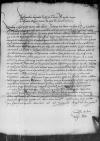Putamus non latere Vestram Paternitatem, quod in praeterito Diet of Poland ⌊generali conventuDiet of Poland ⌋ Poland (Kingdom of Poland, Polonia)⌊regni nostriPoland (Kingdom of Poland, Polonia)⌋ certis rationibus adducti decreveramus cum consiliariis nostris ab indicendo in proximum hunc sequentem annum conventu abstinere contributioneque pecuniaria, quae anteactis annis in publicum defendendi regni onus imponebatur, intermissa, veterem defensionis modum capessere et expeditionem bellicam communibus domesticis viribus sustinere. Quod institutum nostrum cum nunc ex rerum permutatione intra id tempus facta consideremus Poland (Kingdom of Poland, Polonia)⌊reipublicae regni nostriPoland (Kingdom of Poland, Polonia)⌋ non conducere, quae aliis nunc consiliis egere videtur, quam quae nobis praeterito tempore placuerant, in meliorem illud partem vertendum duximus. Etenim praeter id, quod cum Petru IV Raresh (Petrylo) (*ca. 1487 – †1546), 1527-1538 and 1541-1546 Hospodar of Moldavia⌊voyevoda ValachiaePetru IV Raresh (Petrylo) (*ca. 1487 – †1546), 1527-1538 and 1541-1546 Hospodar of Moldavia⌋ et The Tatars ⌊ThartarisThe Tatars ⌋ nullum foedus habeamus illorumque contra dolos et hostilitatem assidue experiamur, non parum nos terret hoc tempore et in metum adducit, quod divina humanaque misceri ubivis gentium audiamus. Huc accedit, quod veremur, ne Suleiman the Magnificent (*1494 – †1566), 1520-1566 Sultan of the Ottoman Empire⌊Thurcorum imperatorSuleiman the Magnificent (*1494 – †1566), 1520-1566 Sultan of the Ottoman Empire⌋ ex depopulatis recens Christianis provinciis tumore sublatus et insolentior factus, nobis inter ceteros negotium aliquod facessere et hostilia inferre contendat. Quare cum ad providendum his impendentibus periculis et statum totius Poland (Kingdom of Poland, Polonia)⌊regni nostriPoland (Kingdom of Poland, Polonia)⌋ in tuto collocandis, commune omnium consilium summe et mature nobis necessarium videretur Diet of Poland ⌊conventum regni generalemDiet of Poland ⌋ in oppido nostro Piotrków (Petricovia), city in central Poland, in the 15th-16th century the location of the assemblies of the Diet (Sejm) of the Kingdom of Poland, today Piotrków Trybunalski⌊PiotrkowPiotrków (Petricovia), city in central Poland, in the 15th-16th century the location of the assemblies of the Diet (Sejm) of the Kingdom of Poland, today Piotrków Trybunalski⌋ ad 1533-01-06⌊diem sanctorum Trium Regum proximum1533-01-06⌋ indiximus. Quoniam vero ex his periculis supra scriptis magna pars Royal Prussia (Prussia Regalis), region, part of Prussia annexed to the Kingdom of Poland in 1466 under the provisions of the Second Peace of Thorn⌊rempublicam terrarum istarum PrussiaeRoyal Prussia (Prussia Regalis), region, part of Prussia annexed to the Kingdom of Poland in 1466 under the provisions of the Second Peace of Thorn⌋ spectare videtur, ad communem consultationem conventum quoque istis ipsis terris in oppido Graudenz (Grudziądz, Graudentium), city in Poland, Voivodeship of Pomerania, on the upper east bank of the Vistula, Graudenz (taking turns with Marienburg (Malbork)) was the venue for the Provincial Diet of Royal Prussia, which were chaired by the bishop of Ermland (Warmia)⌊GraudniczGraudenz (Grudziądz, Graudentium), city in Poland, Voivodeship of Pomerania, on the upper east bank of the Vistula, Graudenz (taking turns with Marienburg (Malbork)) was the venue for the Provincial Diet of Royal Prussia, which were chaired by the bishop of Ermland (Warmia)⌋ pro 1533-01-01⌊die Circumcisionis Domini proximo1533-01-01⌋ indicendum duximus et indicimus hortamurque Vestram Paternitatem, ut ad eundem conventum Graudnicensem prius proficiscatur, deinde habita illic super his, quae per nuntium nostrum proponentur, mutua consultatione, ad Diet of Poland ⌊conventum regni generalemDiet of Poland ⌋ praedictum Piotrków (Petricovia), city in central Poland, in the 15th-16th century the location of the assemblies of the Diet (Sejm) of the Kingdom of Poland, today Piotrków Trybunalski⌊PiotrcoviamPiotrków (Petricovia), city in central Poland, in the 15th-16th century the location of the assemblies of the Diet (Sejm) of the Kingdom of Poland, today Piotrków Trybunalski⌋ veniat et non aliter faciat pro officio suo et gratia nostra.
Bene valeat Vestra Paternitas.


 BCz, 1601, p. 266
BCz, 1601, p. 266